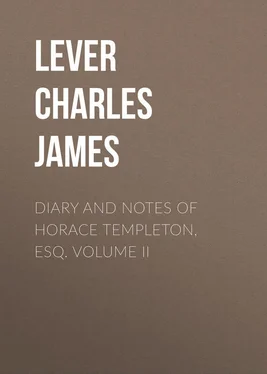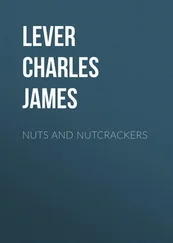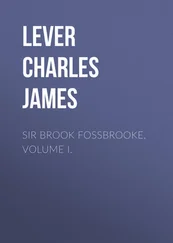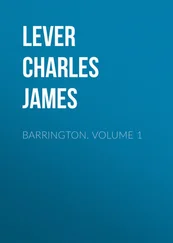Charles Lever - Diary And Notes Of Horace Templeton, Esq. Volume II
Здесь есть возможность читать онлайн «Charles Lever - Diary And Notes Of Horace Templeton, Esq. Volume II» — ознакомительный отрывок электронной книги совершенно бесплатно, а после прочтения отрывка купить полную версию. В некоторых случаях можно слушать аудио, скачать через торрент в формате fb2 и присутствует краткое содержание. Жанр: literature_19, foreign_antique, foreign_prose, на английском языке. Описание произведения, (предисловие) а так же отзывы посетителей доступны на портале библиотеки ЛибКат.
- Название:Diary And Notes Of Horace Templeton, Esq. Volume II
- Автор:
- Жанр:
- Год:неизвестен
- ISBN:нет данных
- Рейтинг книги:5 / 5. Голосов: 1
-
Избранное:Добавить в избранное
- Отзывы:
-
Ваша оценка:
- 100
- 1
- 2
- 3
- 4
- 5
Diary And Notes Of Horace Templeton, Esq. Volume II: краткое содержание, описание и аннотация
Предлагаем к чтению аннотацию, описание, краткое содержание или предисловие (зависит от того, что написал сам автор книги «Diary And Notes Of Horace Templeton, Esq. Volume II»). Если вы не нашли необходимую информацию о книге — напишите в комментариях, мы постараемся отыскать её.
Diary And Notes Of Horace Templeton, Esq. Volume II — читать онлайн ознакомительный отрывок
Ниже представлен текст книги, разбитый по страницам. Система сохранения места последней прочитанной страницы, позволяет с удобством читать онлайн бесплатно книгу «Diary And Notes Of Horace Templeton, Esq. Volume II», без необходимости каждый раз заново искать на чём Вы остановились. Поставьте закладку, и сможете в любой момент перейти на страницу, на которой закончили чтение.
Интервал:
Закладка:
If Fritz’s companion, when within doors, was GrettFa, when he was away on the plain, or among the furze hills, the Starling was ever with him. Indeed he could easier have forgotten his little cap of squirrel-skin, as he went forth in the morning, than the cage, which hung by a string on his back. This be unfastened when he had led his goats into a favourable spot for pasturage, and, sitting down beside it, would talk to the bird for hours. It was a long time before he could succeed in obeying the Curate’s counsel, even in part, and teach the bird not to cry “Potztausend!” Starlings do not unlearn their bad habits much easier than men; and, despite all Fritz’s teaching, his pupil would burst out with the forbidden expression on any sudden emergency of surprise; or sometimes as it happened, when he had remained in a sulky fit for several days together without uttering a note, he would reply to Fritz’s caresses and entreaties to eat by a sharp, angry “Potztausend!” that any one less deeply interested than poor Fritz would have laughed at outright. They were no laughing matters to him. He felt that the work of civilisation was all to be done over again. But his patience was inexhaustible; and a circumstance, perhaps, not less fortunate – he had abundant time at his command. With these good aids he laboured on, now punishing, now rewarding, ever inventing some new plan of correction, and at last – as does every one who has that noble quality, perseverance – at last succeeding, – not, indeed, all at once perfectly; for Star’s principles had been laid down to last, and he struggled hard not to abandon them, and he persisted to cry “Potz – ” for three months after he had surrendered the concluding two syllables; finally, however, he gave up even this; and no temptation of sudden noise, no riotous conduct of the villagers after nightfall, no boiling over of the great metal pot that held the household supper, nor any more alarming ebullition of ill-temper of the good Fran herself, would elicit from him the least approach to the forbidden phrase. While the Starling was thus accomplishing one part of his education by unlearning, little Fritz himself, under Grettl’a’s guidance, was learning to read. The labour was not all to be encountered, for he already had made some little progress in the art under his father’s tuition. But the evening hours of winter, wherein he received his lessons, were precisely those in which the poor bird-catcher, weary and tired from a day spent in the mountains, would fall fast asleep, only waking up at intervals to assist Fritz over a difficulty, or say, “Go on,” when his blunders had made him perfectly unintelligible even to himself. It may be well imagined, then, that his proficiency was not very great. Indeed, when first called upon by Grettl’a to display his knowledge, his mistakes were so many, and his miscallings of words so irresistibly droll, that the little girl laughed outright; and, to do Fritz justice, he joined in the mirth himself.
The same persistence of purpose that aided him while teaching his bird, befriended him here. He laboured late and early, sometimes repeating to himself by heart little portions of what he had read, to familiarise himself with new words; sometimes wending his way along the plain, book in hand; and then, when having mastered some fierce difficulty, he would turn to his Starling to tell him of his victory, and promise, that when once he knew how to read well, he would teach him something out of his book – “Something good;” for, as the Curate said, “that would bring luck.”
So long as the winter lasted, and the deep snow lay on the hills, Fritz always herded his goats near the village, seeking out some sheltered spot where the herbage was still green, or where the thin drift was easily scraped away. In summer, however, the best pasturages lay further away among the hills near Steingaden, a still and lonely tract, but inexpressibly dear to poor Fritz, since there the wild flowers grew in such abundance, and from thence he could see the high mountains above Reute and Paterkirchen, lofty and snow-clad like the “Jochs” in his own Tyrol land. There was another reason why he loved this spot. It was here that, in a narrow glen, where two paths crossed, a little shrine stood, with a painting of the Virgin enclosed within it – a very rude performance, it is true; but how little connexion is there between the excellence of art and the feelings excited in the humble breast of a poor peasant child! The features, to his thinking, were beautiful; never had eyes a look so full of compassion and of love. They seemed to greet him as he came, and follow him as he lingered on his way homeward. Many an hour did Fritz sit upon the little bench before the shrine, in unconscious worship of that picture. Heaven knows what fancies he may have had of its origin; it never occurred to him to think that human skill could have achieved any thing so lovely.
He had often remarked that the villagers, as they passed, would kneel down before it, and with bowed heads and crossed arms seem to do it reverence; and he himself, when they were gone, would try to imitate their gestures, some vague sentiment of worship struggling for utterance in his heart.
There was a little inscription in gilt letters beneath the picture; but these he could not read, and would gaze at their cabalistic forms for hours long, thinking how, if he could but decipher them, that the mystery might be revealed.
How he longed for the winter to be over and the spring to come, that he might lead the goats to the hills, and to the little glen of the shrine! He could read now. The letters would be no longer a secret; they would speak to him, and to his heart, like the voice of that beauteous image. How ardently did he wish to be there! and how, when the first faint sun of April sent its pale rays over the plain, and glittered with a sickly delicacy on the lake, how joyous was his spirit and how light his step upon the heather!
Many a little store of childish knowledge had Grettl’a opened to his mind in their winter evenings’ study; but somehow, he felt as if they were all as nothing compared to what the golden letters would reveal. The portrait, the lonely glen, the solemn reverence of the kneeling worshippers, had all conspired to create for him a mass of emotions indescribably pleasurable and thrilling. Who can say the secret of such imaginings, or bound their sway?
The wished-for hour came, and it was alone and unseen that he stood before the shrine and read the words, “Maria, Mutter Gottes, hulf uns.” If this mystery were unrevealed to his senses, a feeling of dependent helplessness was too familiar to his heart not to give the words a strong significance. He was poor, unfriended, and an orphan: who could need succour more than he did? Other children had lathers and mothers, who loved them and watched over them; their little wants were cared for, their wishes often gratified. His was an uncheered existence: who was there to “ help him? ”
Against the daily load of his duties he was not conscious of needing aid; his burden he was both able and willing to bear. It was against his thoughts in the long hours of solitude – against the gloomy visions of his own free-thinking spirit, he sought assistance; against the sad influence of memory, that brought up his childhood before him, when he had a father who loved him – against the dreary vista of an unloved future, he needed help. “And could she befriend him?” was the question he asked his heart.
“He must ask Grettl’a this; she would know it all!” Such were the reflections with which he bent his way homeward, as eagerly as in the morning he had sought the glen. Grettl’a did know it all, and more too, for she had a prayer-book, and a catechism, and a hymn-book, though hitherto these treasures had been unknown to Fritz, whose instructions were always given in a well-thumbed little volume of fairy tales, where “Hans Däumling” and “The Nutz-cracker” figured as heroes.
Читать дальшеИнтервал:
Закладка:
Похожие книги на «Diary And Notes Of Horace Templeton, Esq. Volume II»
Представляем Вашему вниманию похожие книги на «Diary And Notes Of Horace Templeton, Esq. Volume II» списком для выбора. Мы отобрали схожую по названию и смыслу литературу в надежде предоставить читателям больше вариантов отыскать новые, интересные, ещё непрочитанные произведения.
Обсуждение, отзывы о книге «Diary And Notes Of Horace Templeton, Esq. Volume II» и просто собственные мнения читателей. Оставьте ваши комментарии, напишите, что Вы думаете о произведении, его смысле или главных героях. Укажите что конкретно понравилось, а что нет, и почему Вы так считаете.












